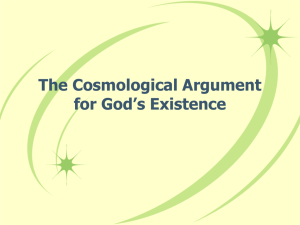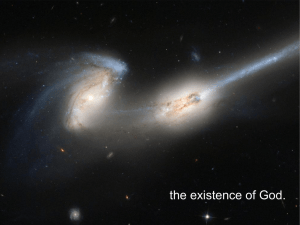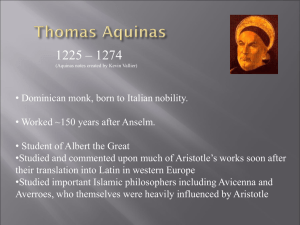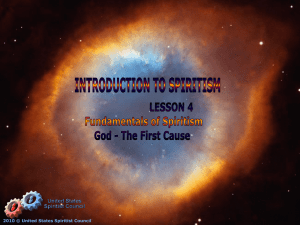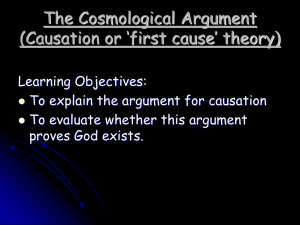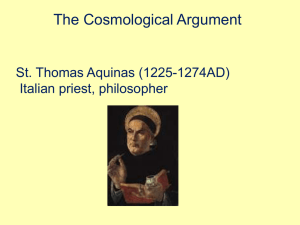Kalam Cosmological Argument
advertisement
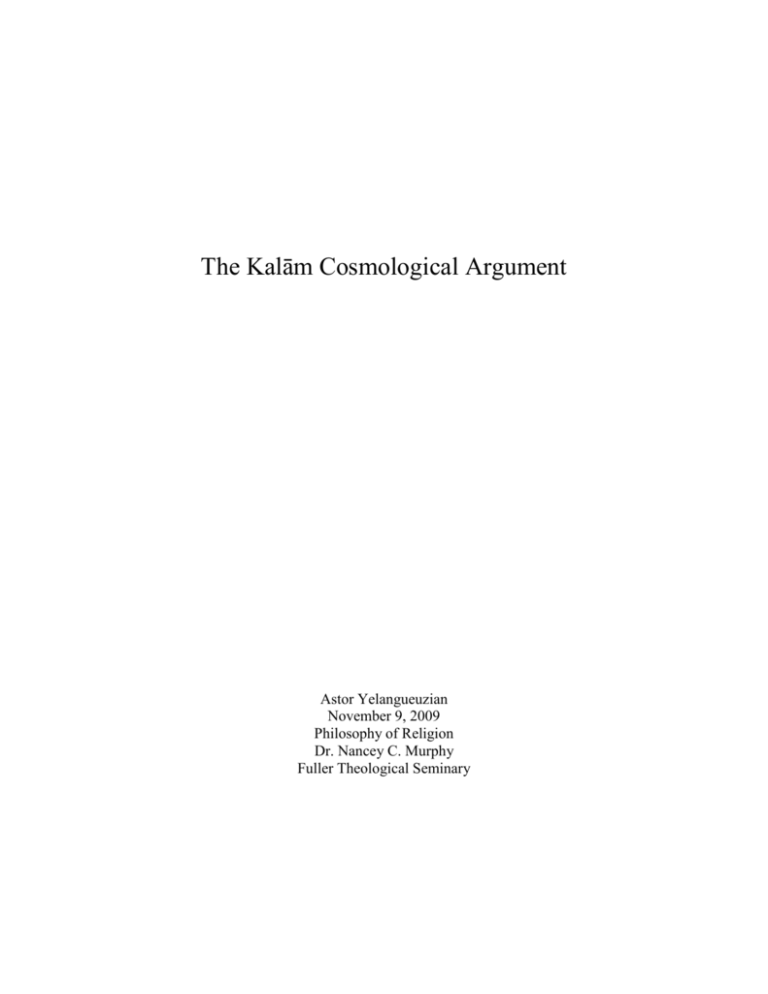
The Kalām Cosmological Argument Astor Yelangueuzian November 9, 2009 Philosophy of Religion Dr. Nancey C. Murphy Fuller Theological Seminary Yelangueuzian 1 Introduction The famous 18th century philosopher Voltaire was once quoted saying, “the very impossibility in which I find myself to prove that God is not, discovers to me his existence.” For Voltaire, the inability to demonstrate that God does not exist, only leads him to confirm that God in fact does exist. With that being said, we wonder if Voltaire ever considered the counter perspective of his thought—namely, if one was unsuccessful in demonstrating that God does exist, would they then have to conclude that God in fact does not exit? Thus, it appears that while one can argue for the existence of God, another could just as easily argue against it. This is the inevitable challenge one faces when entertaining thoughts concerning God’s existence. Nevertheless, like Voltaire, many other individuals throughout western history have offered their own thoughts concerning God—some more convincing than others. These “thoughts” have developed into sophisticated theistic arguments for the existence of God. The presumption has been that one could justify the belief in God by using sound and rational arguments. To be sure, it has proved difficult to decide the issue of the rationality of belief in God, for philosophers dating back to the days of Plato and Aristotle have explored this matter and haven’t come away with clear-cut solutions in which arguments can be accepted. This does not mean, however, that the issue is ultimately undecidable. Rather, it simply means that the subject matter is extremely complex and demands great intellectual effort by inquirers. One view in particular that has seen its fair share of support over the years has been the kalām cosmological argument for the existence of God. The roots of the argument originate in the minds of medieval Arabic philosophers, as they sought to employ a defense for Islamic orthodoxy in the 9th century. In more recent years, however, western thinkers have also adopted the argument for apologetic uses, most notably by Christian philosopher William Lane Craig. Yelangueuzian 2 The argument is in the form of a syllogism, thus, based on two essential premises that lead to a conclusion. The first premise states that everything in the universe has a cause. The second premise states that the universe began to exist. The conclusion therefore follows that the universe must have a cause for its existence. According to Craig, it is impossible for an infinite regress of events to exist and thus, there needs to be a temporal first cause to the universe—i.e. God. Hence, what separates the kalām cosmological argument from other forms of cosmological arguments is that its rest on the idea that the universe has a beginning in time. Therefore, our discussion will primarily be a defense for the kalām cosmological argument, contending that it provides a more than satisfactory reason to belief in a first cause. In doing so, we will first speak on the history of cosmological arguments, for it will serve as a healthy backdrop to our overall discussion. We will then argue that the kalām cosmological argument is convincing enough, insofar as it leads one to conclude that there must be a first cause. In doing so, we will (1) draw most of our reasoning from Craig’s defense for the argument and (2) look at some of the legitimate rebuttals against the argument. Thereafter, we will close with a final assessment of the kalām cosmological argument, pointing out some of the strong points of the argument as well as some of the challenges it presents. Cosmological Argument Before we turn to the history of the kalām cosmological argument, we feel it is necessary to first provide an adequate definition of the cosmological argument itself. Derived from the Greek word κóσμολογíα, cosmology is none other than the study of the universe in its totality, and by extension, humanities place in it.1 Thus, in reference to the cosmological argument, it invokes an empirical fact that contingency begins to exist and/or the universe began to exist. It 1 William Lane Craig, The Cosmological Argument from Plato to Leibniz, (London: The Macmillan Press Ltd, 1980), p. ix. Yelangueuzian 3 argues that an infinite series of causal conditions cannot provide a satisfactory explanation. It concludes that the existence of some necessary being, first cause, or personal agent provides the explanation. It is helpful to know that ‘first cause’ arguments were set forth by Plato and Aristotle in the 4th and 3rd centuries BC and then later picked up my Muslim philosophers in the 9th century AD. These arguments maintain that everything that exists or occurs must have had a cause. Thus, if one could go back in time far enough, they would discover a first cause. We have to mention, however, that there are two versions of the argument: (1) argues that for all things to continue to exist they must be contingent to the first cause and (2) argues for a first cause in time. The Kalām Cosmological Argument Taken literally, kalām is simply the Arabic word for ‘speech’. It came to denote the statement of points of an intellectual position or argument upholding such a statement.2 Eventually, kalām became the name of the whole movement within Arabic scholasticism.3 The arguments date back to Muslim philosophers such as al-Kindi and al-Ghazali. The kalām cosmological argument originated in the attempts of Christian thinkers to rebut Aristotle’s doctrine of the eternity of the universe and was developed by medieval Islamic theologians into an argument for the existence of God.4 The argument is formulated as follows: Premise 1: What ever begins to exist has a cause. Premise 2: The universe began to exist. Conclusion: Therefore, the universe has a cause. 2 William Lane Craig, The Kalām Cosmological Argument, (Oregon: Wipf and Stock Publishers, 1979), p. 4. Ibid. 4 William Lane Craig, Apologetics, (Chicago: Moody Press, 1984), p. 62. 3 Yelangueuzian 4 Al-Ghahzi Let us turn our attention to the formulation of al-Ghazali argument for the existence of God. Al-Ghazali argues, “Every being which begins has a cause for its beginning; now the world is a being which begins; therefore, it possesses a cause for its beginning.”5 In support of the first premise, Ghazali reasons that anything that begins to exist does so at a certain moment of time. But since, prior to the thing’s existence, all moments are alike, there must be some cause that determines that the thing comes to exist at that moment rather than earlier or later. Therefore, anything that comes to exist must have a cause. The second premise is that the world/universe began to exist. In support of this premise, Ghazali contends that it is impossible that there should be an infinite regress of events in time— that is to say, that a series of events should be without a beginning. 6 He gives several reasons for this conclusion. For one thing, the series of past events comes to an end in the present—but naturally an infinite cannot come to an end. It might be helpful to point out that even though the series of events has one end in the present, it can still be infinite in the other direction for it has no beginning. With that being said, however, Ghazali’s point looks to be that if a series is infinite going back to the past, then how could the present moment ever arrive? It couldn’t, for it would be impossible to cross the infinite to get to today. In addition, if the number of past events were infinite, that would lead to infinities of different sizes. Hence, because of the reasons pointed out, al-Ghazali concludes that the universe must have had a beginning. Therefore, one could then easily understand why al-Ghazali reached the conclusion that the universe must have a cause of its beginning. Subsequently, al-Ghazali recognizes this cause as God. Al-Ghazali, Kitab al-Iqtisad fi’l-I’tiqad, Cited in Beaurecueil, S. de. (Bullentin de Institut Francais d’ Archaelogie Orienttale, 1947). p. 203. 6 Craig, Apologetics, p. 63. 5 Yelangueuzian 5 William Lane Craig We will now turn to William Lane Craig’s defense for the kalām cosmological argument, for we believe he provides a convincing argument in support of this view. For Craig, premise one seems obviously true—or at least, more so than false. The grounds for this claim are based on the fact that most empirical data does not deny it. Although some claim that quantum physics has shown us that something’s can suddenly spring out of nothing, he provides sufficient warrants for his grounds. Firstly, according to Craig, it is rooted in the metaphysical intuition that something cannot come into being from nothing—ex nihilo. Craig contends that if things could come into being uncaused out of nothing, then it becomes inexplicable why just anything and everything do not come into existence uncaused from nothing. Secondly, the thought that an origin of the universe requires a casual explanation seems quite reasonable for Craig—for on the atheistic view, if the universe began at the big bang, there would not even be the potentiality of the universe’s existence prior to the big bang, since nothing is prior to it. This then leaves Craig to ask the inevitable question: how could the universe become actual if there was not even the potentiality of its existence? For Craig, it simply couldn’t. And thirdly, Craig argues that the first premise is constantly confirmed in our experience. Now in response to premise two, Craig argues that it is supported by both deductive, philosophical arguments, and inductive, scientific arguments. In the case of the former, Craig contends that an infinite temporal regress of events, does not exists, since the existence of ‘an actually infinite,’ as opposed to ‘merely potentially infinite,’ number of things is clearly absurd.7 It is alleged that an actual infinite comes from set theory. Craig points out that philosopher Georg Cantor invalidated the argument for an actual infinite, for he demonstrated that while the actual The concept of an actual infinite reached the Muslims through the works of Aristotle. Aristotle’s metaphysics speaks of the subject of actually vs. potentially. Actuality is understood as the fulfillment of being—that there is no actual being of infinite processes. Potentiality is understood as realized over time by addition or division. 7 Yelangueuzian 6 infinite may be a consistent concept within the postulated universe of discourse, it cannot be transported into the spatio-temporal world—this would involve counterintuitive absurdities.8 Craig is famous for describing the impossibility of an actual infinite like an endless bookcase. Imagine a bookcase, Craig argues, that extends infinitely on which there is an infinite amount of books, colored blue and red, red and blue and so on. Clearly, there would be an infinite number of books. He then argues, imagine removing all the blue colored books, leaving an infinite number of red books remaining, leading to the conclusion that “infinity” divided by two is also “infinity.” Craig claims that the inability to extend the standard definitions of division on finite, nonzero numbers to include infinite numbers demonstrates the physical impossibility of actual infinities.9 Thus for Craig, since the universe cannot have existed for an actually infinite amount of time, it must have come to existence at some finite time in the past. Moreover, Craig offers another defense for premise two, as he contends that traditionally it has been argued that the temporal series of events cannot be an actual infinite because of a collection formed by successive addition cannot be actually infinite. According to the argument, in order for us to “arrive” at today, temporal existence has traversed an infinite number of prior events.10 But before the present event could arrive, the event immediately prior to it would have to arrive; and so on.11 Meaning, no event could arrive, since before it could end there will always be one more event that will had to have happened first. Thus, Craig’s contends that if the series of events were beginningless, the present could not have arrived—clearly this is absurd. 12 8 William Lane Craig, The Cambridge Companion to Atheism, Edited by Michael Martin (New York: Cambridge University Press, 2007), p. 77. 9 William Lane Craig and Quentin Smith: Theism, Atheism, and the Big Bang Cosmology, (New York: Oxford University Press, 1993), p. 13. 10 Craig, The Cambridge Companion to Atheism, p. 77. 11 Ibid. 12 Ibid. Yelangueuzian 7 As a third defense to premise two, Craig turns to an inductive argument, contending that the there is no evidence for the expansion of the earth. In the twentieth century, there have been a long series of failed attempts to craft plausible models of expanding the universe. While some theories are possible, most scientists believe the most successful model is the traditional big bang theory. Craig supports his claim by mentioning that the big bang model describes not the expansion of the material content of the universe into a pre-existing, empty space, but rather the expansion of space itself. 13As one goes back into time, space-time cur becomes progressively greater until one arrives at a singularity, at which space-time curvature becomes infinite.14 Thus, this constitutes a boundary to space-time itself. It is worth mentioning that Craig notes that the no-boundary universe proposed by Hartle and Hawking, if interpreted realistically, still involves an absolute origin of the universe even if the universe does not begin in a singularity, as it is in the big bang theory.15 In a fourth argument to defend premise two, Craig draws on another inductive argument, appealing to thermodynamic properties of the universe. According to the second law of thermodynamics, processes taking place in a closer system tend toward states of higher entropy, as their energy is used up.16 Here, Craig notes that in the 19th century, scientists realized that the law of the universe implied a dour eschatological conclusion: given sufficient time, the universe would come to a state of equilibrium and suffer heat death.17 Naturally, this begs the question: if, this conclusion is true, then why is it not now in a state of heat death? According to Craig, astrophysical evidence indicates overwhelmingly that the universe will expand forever. As it 13 Ibid., p.78. Ibid. 15 Ibid. 16 Ibid. 17 Ibid. 14 Yelangueuzian 8 does it will become increasingly cold, dark, dilute and eventually dead.18 With that being said, however, if in a finite amount of time the universe will achieve a cold, dark, dilute and lifeless state, then why if it has existed for infinite time, is it now not in such a state? Hence, for Craig, if one is to abandon the conclusion that the universe did not in fact exist forever, then one is left with finding some scientifically plausible way to overturn the findings of physical cosmology so as to permit the universe to return to its youthful condition. Up to this point in time, no such plausible scenario is forthcoming. What follows therefore is that the universe has a cause. This cause must be understood as uncaused and characterized as beginningless, changeless, immaterial, timeless, and spaceless. Craig is left with arguing that this cause is non-other than God—the creator of the universe. Legitimate Rebuttals William Lane Craig’s case for the legitimacy of the kalām cosmological argument has seen its fair share of criticisms over the years, even among theistic philosophers of religion. The reason seems to be that many do not accept Craig’s argument that the past is necessarily finite and therefore that the universe must begin to exist. Many theists are also not as sure as Craig that the first premise is “obviously true,” the first premise being, “whatever begins to exist has a cause.” With that being said, however, no one has been able to challenge Craig as successfully as that of contemporary atheist Quentin Smith. Hence, this is where we will now turn our attention, namely, examining Smith’s rebuttals of Craig’s defense for the kalam cosmological argument. According to Smith, the kalām cosmological argument when formulated in a manner consistent with contemporary science is not an argument for God’s existence but an argument for God’s nonexistence. Thus for Smith the cause of the universe was not God, but the universe itself. 18 Ibid. Yelangueuzian 9 According to Smith, one version of Einstein’s general theory of relativity is formulated as “big bang cosmology,” which is used to explain the observations that the universe began to exist 15 billion years ago in an extremely small explosion of densely backed matter and energy. 19 Smith argues that this matter and energy was compacted so densely that it was smaller than an electron. Due to the explosion force of the big bang explosion, the universe began to expand and it has been expanding ever since. These eventually led to the formation of the stars and galaxies. Smith argues that the big bang explosion implies that the universe is deterministic, that is, that each state of the universe is sufficiently caused by an earlier state.20 On this basis, Smith accepts premise one. With that being said, however, for Smith this is based on empirical grounds—that is, empirical laws of nature. Moreover, Smith also accepts that the universe began to exist, because of scientific observations tell us so. That being said, Smith does not accept Craig’s a priori arguments that an actually infinite past is impossible. Furthermore, according to Smith, Craig’s theory is inconsistent with big bang cosmology, which is subsequently the theory he uses in his empirical argument for the thesis that the universe began to exist. According to big bang cosmology and Einstein’s general theory of relativity, the universe has a topology, which is a set of actually infinite subsets that have certain relations to each other.21 Apparently, these theories also state that the universe is a continues manifold, which is a set of an actual infinite, specifically, actual continuum-many points. 22 The universe also has a metric, which demarcates time into intervals of various lengths, hours, days, years and so on. As it goes, the intervals demarcated by the metric are sets of actually infinite, 19 Quentin Smith, The Cambridge Companion to Athiesm, p, 184. Notes taken in class on the subject of Newtonian physics. 21 Smith, The Cambridge Companion to Atheism, p. 187. 22 Ibid. 20 Yelangueuzian 10 continuum-many instants. Thus, Smith argues that in general relativity and big bang cosmology a metric is defined on a point in an actually infinite continuum. Obviously, this goes against Craig’s point of actual infinite. His theory implies there cannot be an actually infinite topological structure of the universe, there cannot be an actually infinite manifold, and that there cannot be an actual infinite metric defined on appoint in an actually infinite continuum of points. Therefore, Smith points out that Craig’s theory expresses highly disconfirmed propositions of science. That being said, Smith also argues that Craig’s theory of “potential infinite” also makes his theory inconsistent with science, specifically in regards to big bang cosmology. But, unfortunately Smith does not explain how. His claim is not supported with any grounds. Hence, we are left with no choice but to disregard this claim. Moreover, Smith then goes to attack Craig’s a priori argument for a merely potential infinite, calling it self-contradictory. Smith asks, “if one is to say that the infinite has a potential existence, and it does not mean it can actually exist, what could “potential” mean then?”23 Smith here is harsh on Craig, stating that this trades a self-contradictory theory for an unintelligible theory. 24 Smith is left to conclude that no sense can be made of this claim that the infinite has a “potential,” implying that there will not be an actual finite, thus making a case that there is only actual finite things. Hence, Smith feels justified when he says that if Craig’s theory is both empirically disconfirmed and logically self-contradictory, this does not present any problems of for the construction of a kalām cosmological argument supporting atheism. Furthermore, this leaves Smith to argue that the universe both caused itself to exist and caused later states to exist. For Smith, the universe does not need an extra cause; of all parts of the universe cause each other to exist, that logically implies that the whole exists. Smith’s claim 23 24 Ibid. Ibid. Yelangueuzian 11 is that “the first state of the universe consists of an infinitely long chain of simultaneous events that are casually connected to each other.”25He refers to these chain of events as intervals. For Smith there is no first instant, but rather an infinite amount of briefer and briefer first intervals of a given length. There is no such thing as an earliest closed interval, for there are infinite sequences of intervals. Thus, the beginning of the universe does not belong to one instant but an infinite amount. Smith demonstrates how this happens by using quantum mechanics. Conclusion After closely examining arguments for and against the kalām cosmological argument, we maintain that Christian philosopher William Lane Craig offers a “more than satisfactory” case to accept the kalām cosmological argument, insofar as it leads one to conclude that there must be a first cause, not the existence of God. We are not convinced by Smith’s argumentation for how big bang cosmology can explain the beginning of the universe. An infinite amount of intervals does not provide a satisfying answer for a beginning. Moreover, Smith’s use of quantum mechanics does not appear to be more plausible than Craig’s theory. Thus, we agree with Craig that the universe is not infinite in the past, but has a finite beginning which demands a cause for its existence. First of all, we want to make it clear that our intention in the discussion was not to argue that the kalām argument is absolutely true, but rather that it offers a more than satisfactory case for a first cause of the universe compared to alternative suggestions. Because we are fully aware that the things we don’t know far outweigh the things that we do know, we recognize our limitations in knowledge and understanding. Hence, we do not believe that we are capable of reaching absolute certainty by any means, be it by philosophy, science, mathematics and so on. The best we can do is accept the most reasonable explanation for things. 25 Ibid. p, 190. Yelangueuzian 12 Secondly, we are also fully aware that the kalām argument is a based on deductive reasoning, making the argument base its first premise on a “basic belief” that appears to be indubitable.26 Having said that, however, we do not see any trouble with this particular basic belief, for it does not appear to run the risk of depending on presuppositions that legitimize its truthfulness. To argue that causation and beginningness is a presumption, we believe is to deny reality itself, for no rational human can name a thing that exists in the world without having a beginning nor a cause. Some have argued that new quantum physics demonstrates that certain electrons can pass out of existence at one point and then come back into existence elsewhere, leaving no intermediate existence or determined cause for its existence. Modern physics, nevertheless, argues that a vacuum is not nothing but rather a state of minimal energy, thus electrons do not simply appear out of nothing. This phenomenon is backed up by the theory of Casimir Effect, which states that vacuum energy is “real” in the same sense that more familiar objects such as electrons, magnetic fields are real.27 Hence, not only do we support our theory by deductive argumentation, but also by inductive scientific argumentation. Moreover, we believe that Craig offers a sound argument for premise two, namely that the universe began to exist, for an infinite regress of events in time is impossible. Here is the strongest point in Craig’s defense, for he speaks of an actual infinite not existing. The work of Georg Cantor demonstrates that actual infinities are consistent and useful objects. However, having said that, this does not apply in the real world, for it can only be applied to circumstances in mathematics.28 Although some claim that Zeno’s paradoxes demonstrate examples of real infinities in the world, particularly, the number of points in space, this has not been accepted a 26 We should note that we believe that deductive reasoning does not work in every scenario. However, in this particular case, we cannot see a problem for its use and legitimacy. 27 Michael Peterson, Reason & Religious Belief: An Introduction to the Philosophy of Religion, (New York: Oxford Press, 2009), p 97. 28 Craig, The Kalām Cosmological Argument, p. 68. Yelangueuzian 13 wide range of professionals.29 Nevertheless, it is impossible that there should be an infinite regress of events in time, for the series of past events comes to an end in the present. Moreover, if a series is infinite, going back to the past, then how could the present moment ever arrive? It couldn’t, for it would be impossible to cross the infinite to get to today. We are also aware that the kalām argument does present some challenges for theists, particularly, for the use of apologetics. For one, it does not establish the existence of any particular deity, nor does provide any properties of the “first cause” outside the predicting of the universe. Hence, there is a problem with linking God to the first cause, for the argument it self does not warrant this connection. All the argument states is that the universe must have a cause. What this cause is goes beyond the arguments premises. Nevertheless, this might be the reason why Christians have been able to successfully defend this formula from Islamic tradition, for it provides equal support for Christianity as well Islam. In order for one to insert “God” into the formula would require a well-develop and coherent argument for the nature of the first cause. Another problem is that the premise of causality has been understood as via a poseteri (inductively) reasoning, which is based on experience. David Hume focused on the problem of induction and showed that causal relations were not true a priori (deductively).30 Whether inductive or deductive reasoning is more valuable however still remains a debate by most philosophers. Moreover, the rules of causality seem to only make sense in the context of time, which did not exist before the creation of the universe, which makes it troubling to speak of a pre-universal first cause. So, the challenge is what caused this first cause. Clearly, this is where the buck stop’s for most people, as God is introduced into the formula. But as we noted above, it would have to require a lot of persuasion to bridge a gap between first cause and God. 29 30 Ibid., p.175. Class notes on October 8th 2009. Yelangueuzian 14 Bibliography Craig, William Lane. The Cosmological Argument from Plato to Leibniz. London: The Macmillan Press Ltd, 1980. Craig, William Lane. The Kalām Cosmological Argument. Oregon: Wipf and Stock Publishers, 1979. Craig, William Lane. Apologetics. Chicago: Moody Press, 1984. Craig, William Lane. The Cambridge Companion to Atheism, Edited by Michael Martin. New York: Cambridge University Press, 2007. Craig, William Lane and Smith, Quentin. Theism, Atheism, and the Big Bang Cosmology. New York: Oxford University Press, 1993. Peterson, Michael. Reason & Religious Belief: An Introduction to the Philosophy of Religion. New York: Oxford Press, 2009.
